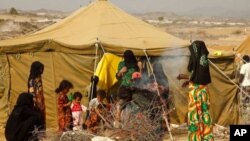The United Nations refugee agency says international aid workers have been able to visit the capital of the troubled northern Saada province in Yemen for the first time in eight months. It says the cease-fire between the Yemeni government and Houthi rebels from the Shi'ite Zaidi sect appears to be holding.
Saada province has been off limits to aid agencies since August when the so-called sixth war between the government and the Houthi rebels erupted. This on-again, off-again war has been going on since 2004.
A cease-fire came into effect in mid February and the war was officially declared over one week ago. This has made it possible for aid workers to finally gain access to the capital of the northern Saada province.
U.N. refugee spokeswoman, Melissa Fleming, says a team of U.N., non-governmental and government representatives visited the area and met local authorities to discuss the overall needs of the population.
She says the team was able to get a first hand impression of the situation of displaced Yemeni civilians in the city, as well as conditions there. "The team reported that the city appears to be recovering and returning to life as the streets of Saada were bustling with people. The traffic and all the shops were open. Prices of basic necessities are gradually decreasing and the supply of water and electricity are improving and some schools are re-opening," said Felming.
The war has exacted a heavy toll. The Yemeni government estimates about 350,000 people have been displaced. Some 22,000 are still in Saada city.
Fleming says most of the displaced are living with family and friends. But, she says the mission visited six camps for internally displaced people in Saada, hosting 4500 people. Although these numbers are relatively small, she says the camps are desperately overcrowded.
Although the situation is improving, she says there are some continued concerns.
"Concerns that the ceasefire, although it has been holding, is still fragile. Concerns about ordnance and mines. Tragic incidents are frequent. In fact on Monday, a group of boys wanted to collect firewood and one of them, a 16-year old found, what he thought was an attractive object, picked it up and the landmine killed him on the spot. De-mining is required, assistance is required," said the spokeswoman.
Fleming says funding for UNHCR's humanitarian operation in northern Yemen has improved. She says the agency now has received 30 percent of its needs, and she hopes the money will continue to come in and increase.
She says large scale, voluntary and safe return to Saada province will require stability and security as well as considerable reconstruction and a swift aid effort.
She says many homes have been damaged or destroyed in Saada and both the returning displaced and those who never left the province need immediate assistance. She says food and essential shelter materials are among the highest priorities.
Cease-Fire Between Yemeni Government, Houthi Rebels Holding




